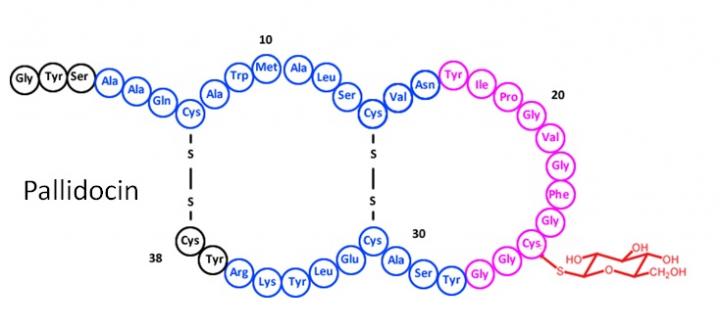
Credit: Oscar Kuipers / University of Groningen
University of Groningen microbiologists and their colleagues from Lithuania have discovered a new glycocin, a small antimicrobial peptide with a sugar group attached, which is produced by a thermophilic bacterium and is stable at relatively high temperatures. They also succeeded in transferring the genes required to produce this glycocin to an E. coli bacterium. This makes it easier to produce and investigate this compound, which could potentially be used in biofuel production. These findings were published in Nature Communications on 7 March.
The rise of antibiotic resistance has spurred the search for new antimicrobials. Bacteriocins – peptide toxins produced by bacteria to inhibit growth in similar or related bacterial strains – are a possible alternative to the more traditional antibiotics. Bacteriocins would also be useful to protect high-temperature fermentations mediated by thermophilic bacteria. But this would require the use of bacteriocins that are stable at higher temperatures.
Mystery
‘That is why we were interested to find that the thermophilic bacterium Aeribacillus palladius, isolated from the soil above an oil well in Lithuania, appeared to produce an antibacterial peptide,’ says University of Groningen Professor of Molecular Biology, Oscar Kuipers. Thus far, purification and identification of the compound had not been successful. Therefore, Ph.D. student Arnoldas Kaunietis from Vilnius University spent almost two years in Kuipers’ lab to solve the mystery. He is the first author on the new paper.
By analyzing genomic information from the Lithuanian bacteria using BAGEL4 software, developed by Anne de Jong and Auke van Heel in Kuipers’ group, genes that are responsible for the production of the bacteriocin were discovered and the final gene product was named pallidocin. The BAGEL4 software searches for gene clusters with the potential ability to produce novel antimicrobials.
Sugar
The antimicrobial turned out to be a glycocin, belonging to a class of post-translationally modified peptides. This means that after its production, one or more functional groups are added to the peptide. In the case of glycocins, this functional group is a sugar. ‘Only five other glycocins were known thus far,’ says Kuipers.
In order to facilitate further research and engineering of this peptide, the genes responsible for the production of pallidocin were transferred to E. coli BL21 (DE3) bacteria. ‘The expression of the genes worked well, which is a real breakthrough, as it is difficult to express a whole antimicrobial gene cluster from a gram-positive bacterial strain directly in a gram-negative bacterium and to get the product secreted.’
Biofuel
After isolating pallidocin, the scientists were able to confirm that it is highly thermostable and exhibits extremely strong activity against specific thermophilic bacteria. Furthermore, by using the sequence of pallidocin biosynthesis genes in BAGEL4, two similar peptides were discovered in two different strains of Bacillus bacteria. These peptides, named Hyp1 and Hyp2, were also successfully expressed in the E. coli strain. ‘This shows that the expression system works well for various glycocins; it is able to produce them in vivo’, says Kuipers.
Pallidocin might be useful in high-temperature fermentations, which are used to produce biofuels or chemical building blocks. The higher temperature makes it easier to recover volatile products such as ethanol but also reduces the risk of contamination with common bacteria. However, contamination with thermophilic bacteria is possible. ‘Both pallidocin and Hyp1 appear to be active against thermophilic bacteria and some Bacillus species,’ says Kuipers. And there could be more applications: ‘Contamination by thermophiles is also a problem in the food industry.’
###
Reference: Arnoldas Kaunietis, Andrius Buivydas, Donaldas J. ?itavičius & Oscar P. Kuipers: Heterologous biosynthesis and characterization of a glycocin from a thermophilic bacterium. Nature Communications 7 March 2019
Media Contact
Rene Fransen
[email protected]
Original Source
https:/
Related Journal Article
http://dx.



